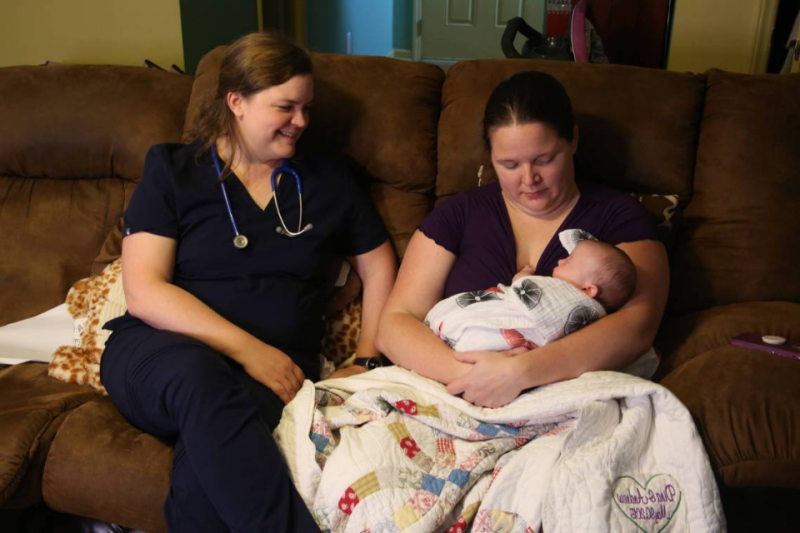
Family Connects, a nurse home visiting program for newborns and their families, is linked to substantial reductions in child maltreatment investigations in children’s first five years, according to new research from Duke University.
Families who were offered Family Connects experienced 39% fewer investigations for suspected child abuse and neglect than other families in the same community. These families also had 33% less emergency medical care use than the control group in their children’s first 5 years of life.
“We’re now able to demonstrate that Family Connects home visits shortly after birth have positive impacts through the transition to school,” says Ben Goodman, research scientist at Duke’s Center for Child and Family Policy and research director for Family Connects International. “It’s exciting to see that early interventions can really make a difference for entire communities.”
The results appeared July 7 in JAMA Network Open. Robert Murphy, PhD, associate professor in Psychiatry & Behavioral Sciences and executive director of the Center for Child and Family Health, co-authored the article.
The findings are based on a randomized clinical trial first conducted in 2009 and 2010, and on analysis of hospital and Child Protective Services records in ensuing years.
Between July 1, 2009 and December 31, 2010, parents of all 4,777 babies born in Durham County, North Carolina during that time period were randomly assigned to receive the Family Connects program or treatment as usual. The research team then randomly selected a subgroup of 549 families from the full population for a long-term study, which included review of hospital and Child Protective Services records.
The reduction in child maltreatment investigations was apparent across all subgroups tested, regardless of infant medical risk, infant gender, health insurance status or whether the child had one or two parents in the home. These findings support the value of offering the program universally, to all members of a community.
To calculate total child emergency medical care use, the researchers reviewed hospital records of the newborns from discharge from the hospital through age five. They tallied the number of emergency department visits, plus the number of overnight stays in hospital. The total number of emergency visits and hospital stays was significantly less for those children whose families participated in the Family Connects program versus the control group.
Family Connects provides home visits from a trained, registered nurse shortly after the birth of a child. The nurse conducts infant and postpartum health checks and refers new parents to resources within their community that meet their individual needs and preferences. These may include substance abuse treatment, maternal depression counseling, general parenting support, housing assistance or childcare resources.
The research-based public health program aims to improve health community-wide, reaching as many families as possible in communities where it is available. The Family Connects program is unusual in emphasizing community-wide impact and short-term duration, with a relatively low cost of about $500-700 per community birth.
Managed by Duke University’s Family Connects International, the model originated as a partnership between the Center for Child and Family Policy at Duke and the nonprofit Center for Child & Family Health in Durham, N.C. Family Connects International has since grown and is in various stages of planning and implementation in 17 states. The model has been evaluated through two randomized clinical trials. As the program continues to expand, research and evaluation will continue.
Funding for this study was provided by The Duke Endowment, the Pew Center on the States and the Eunice Kennedy Shriver National Institute of Child Health and Human Development (grant R01HD069981).
CITATION: “Effect of a universal postpartum nurse home visiting program on child maltreatment and emergency medical care at 5 years of age,” W.B. Goodman, K A. Dodge, Y Bai, R.A. Murphy and K. O’Donnell. JAMA Network Open, July 7, 2021.
DOI:10.1001/jamanetworkopen.2021.16024.
This press release was originally published in Duke Today.